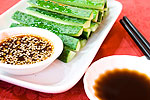 Chinese medicinal herbs have a long, long history — even dating as far back as 160 B.C. The Chinese “materia medica” is a reference book used by Traditional Chinese Medicine (TCM) practitioners. The book cites hundreds of medicinal substances, most of which are found in plants. These herbal medicines are classified by the health effects they exert on the body. Different parts of plants such as the leaves, roots, stems, flowers, and seeds are used (click here to learn more about TCM).
Chinese medicinal herbs have a long, long history — even dating as far back as 160 B.C. The Chinese “materia medica” is a reference book used by Traditional Chinese Medicine (TCM) practitioners. The book cites hundreds of medicinal substances, most of which are found in plants. These herbal medicines are classified by the health effects they exert on the body. Different parts of plants such as the leaves, roots, stems, flowers, and seeds are used (click here to learn more about TCM).
There are 50 herbs that are considered fundamental when it comes to practicing TCM. One of those herbs, “Trichosanthes kirilowii,” has a great track record when it comes to protecting good health.
“Trichosanthes kirilowii,” or Chinese cucumber, is known for its anti-tumor and anti-HIV properties. It is also known for its ability to help regulate the immune system. Researchers at the Department of Immunology, Medical School of Yangtze University, China, have found another interesting health benefit of Chinese cucumber — it may help prevent transplantation rejection.
What is transplantation rejection? This happens when an organ or tissue is taken from one part of the body and then grafted into another part (of the same person or in a completely different individual) and for some reason it is rejected by the recipient’s immune system.
For their study, a research team explored the potential effect of Chinese cucumber on graft rejection during a skin transplantation procedure. They found that treatment of mice with trichosanthin (a compound found in Chinese cucumber) significantly delayed graft rejection. Immune cells that originated from recipients treated with trichosanthin showed a significantly reduced response compared with that of control recipients. The researchers concluded that their results indicate that trichosanthin may have potential therapeutic value for transplantation rejection and other inflammatory diseases.
Chinese cucumber is also showing promising results in the treatment of arthritis. Keep an eye on this herb — one of the “fundamental 50” for its potential to help with a number of health complaints.
